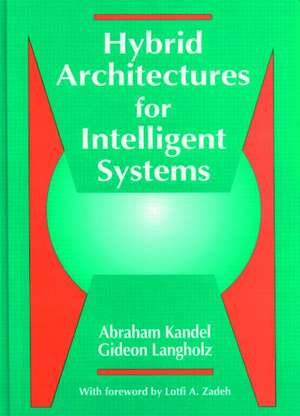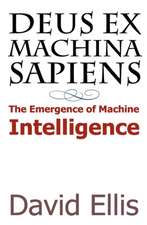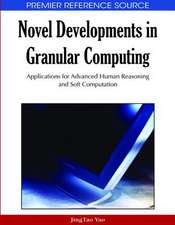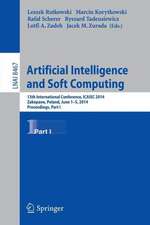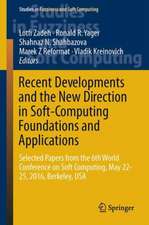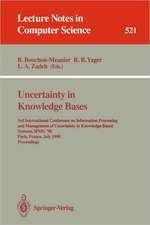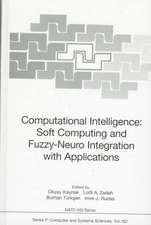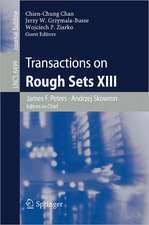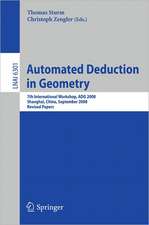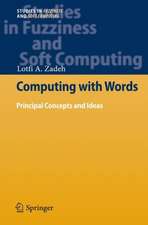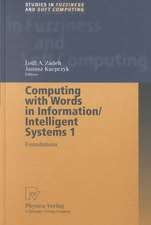Hybrid Architectures for Intelligent Systems
Autor Abraham Kandel, Gideon Langholzen Limba Engleză Hardback – 21 feb 1992
The book is divided into two parts. The first part is devoted to the theory, methodologies, and algorithms of intelligent hybrid systems. The second part examines current applications of intelligent hybrid systems in areas such as data analysis, pattern classification and recognition, intelligent robot control, medical diagnosis, architecture, wastewater treatment, and flexible manufacturing systems.
Hybrid Architectures for Intelligent Systems is an important reference for computer scientists and electrical engineers involved with artificial intelligence, neural networks, parallel processing, robotics, and systems architecture.
Preț: 1407.42 lei
Preț vechi: 1759.28 lei
-20% Nou
Puncte Express: 2111
Preț estimativ în valută:
269.30€ • 281.93$ • 222.84£
269.30€ • 281.93$ • 222.84£
Carte tipărită la comandă
Livrare economică 05-19 aprilie
Preluare comenzi: 021 569.72.76
Specificații
ISBN-13: 9780849342295
ISBN-10: 0849342295
Pagini: 448
Dimensiuni: 178 x 254 x 28 mm
Greutate: 1.02 kg
Ediția:1
Editura: CRC Press
Colecția CRC Press
Locul publicării:Boca Raton, United States
ISBN-10: 0849342295
Pagini: 448
Dimensiuni: 178 x 254 x 28 mm
Greutate: 1.02 kg
Ediția:1
Editura: CRC Press
Colecția CRC Press
Locul publicării:Boca Raton, United States
Public țintă
ProfessionalNotă biografică
Abraham Kandel and Gideon Langholz
Cuprins
THEORY, METHODOLOGIES, ALGORITHMS. NEURAL NETS AND FUZZY LOGIC (A.F. da Rocha and R.R. Yager). Preliminary Concepts. Basic Components of Modular Neural Networks. Modular Networks. NODE ERROR ASSIGNMENT IN EXPERT NETWORKS (R.C. Lacher). Discrete Time Neural Computation. Node Error Assignment. Expert Network Backprop. Computational Experiments. LEARNING SYSTEM FOR GRAMMARS AND LEXICONS (J. D'souza and M. Schneider). Learning. Modifying the Lexicon. Modifying the Grammar. Creating a Grammar. Relationship between FEST and LSGL. INTEGRATION OF NEURAL NETWORK TECHNIQUES WITH APPROXIMATE REASONING IN KNOWLEDGE-BASED SYSTEMS (M.E. Cohen and D.L. Hudson). Approximate Reasoning in Knowledge-Based Systems. A Neural Network Learning Algorithm. Combined Techniques. A PARALLEL DISTRIBUTED APPROACH FOR KNOWLEDGE-BASED INFERENCE AND LEARNING (L-M Fu). A Knowledge-Based Neural Network. Inference. Learning. Evaluation. PERFORMANCE ISSUES OF A HYBRID SYMBOLIC, CONNECTIONIST ALGORITHM (L.O. Hall and S.G. Romaniuk). Network Structure. Learning. Analysis of Learning. Global Attribute Covering Algorithm. The Two Spirals Problem. Diagnosing Semiconductor Wafer Failures. A HYBRID ARCHITECTURE FOR FUZZY CONNECTIONIST EXPERT SYSTEM (R.J. Machado and A.F. da Rocha). Architecture of Fuzzy Connectionist Expert Systems. Example of an Application. MODELS AND GUIDELINES FOR INTEGRATING EXPERT SYSTEMS AND NEURAL NETWORKS (L.R. Medsker and D.L. Bailey). Models for ES/NN Synergy. Application Review. Guidelines for Developmental of Hybrid Systems. FUZZY HYBRID SYSTEMS (C. Posey, A. Kandel, and G. Langholz). Expert Systems. Neural Networks. Fuzzy Hybrid Systems. Conversion from Fuzzy Expert System to Neural Network. Knowledge Transfer from Neural Network to Expert System. Learning Results. HYBRID DISTRIBUTED/LOCAL CONNECTIONIST ARCHITECTURES (T. Samad). Distributed and Local Representations. Hybrid Distributed and Local Representations. Hybrid Distributed/Local Networks. A Connectionist Rule-Based Syste
Descriere
Hybrid architecture for intelligent systems is a new field of artificial intelligence concerned with the development of the next generation of intelligent systems
